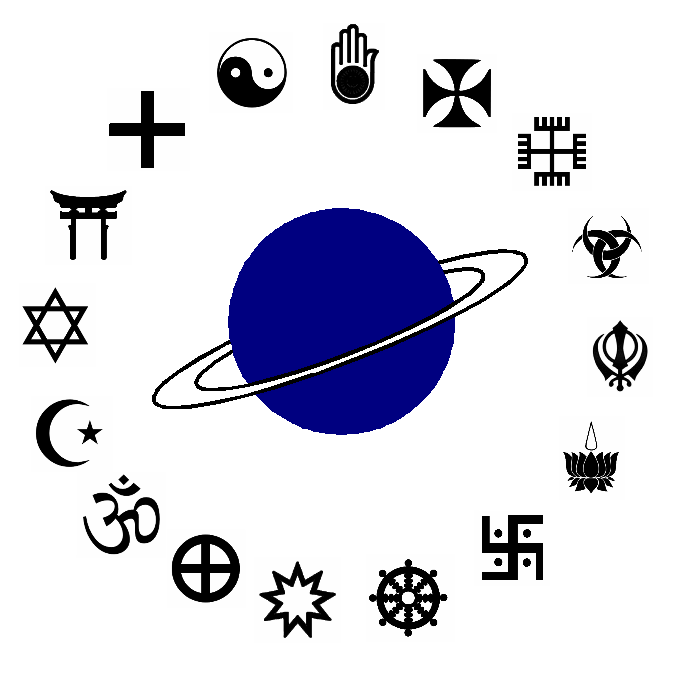God(s) are not real. By God, I mean a supreme being that people believe is the creator of all things. Religion, as a whole, is a way for certain institutions to act as shepherds herding their sheep followers into acting and thinking in a certain way. If you cannot tell by now, I’m an atheist.
I don’t believe in an all-powerful creator. I don’t believe the heavens and the Earth were created in six days. I don’t believe in Adam and Eve. I don’t believe the Earth is only 6,000 years old as it is told in the Bible. I don’t believe in any heaven or hell, nor do I believe in reincarnation. Believing in an afterlife is narcissistic because it says you can’t imagine a universe without you.
I believe in science. I believe in evolution as fact and theory. I believe the universe began 13.82 billion years ago with the Big Bang. I believe that when we die, we end; we cease to exist.
I was not raised an atheist, nor did I become one in spite of any one religion. I became an atheist because I learned about science in school. Science is fact-based, whereas religion is not. Science adjusts its views based on what’s observed. Faith is the denial of observation so that belief can be preserved.
Well-known ethologist and writer Richard Dawkins describes faith as “The great cop-out. The great excuse to evade the need to think and evaluate evidence. Faith is belief in spite of, even perhaps because of, the lack of evidence.”
Religion is based on faith, which is defined by Webster’s Dictionary as strong belief in God or in the doctrines of a religion, based on spiritual apprehension rather than proof. My brain doesn’t work in a way that allows it to believe in something has no factual basis or proof of its existence.
There are more than 4,200 religions around the world. If you think about it, believing your religion is the correct one and the other 4,199 religions are wrong based off of “faith” and not fact is extremely arrogant.
The observable universe, which includes the 54 galaxies that include the Milky Way Galaxy and the Andromeda Galaxy, the Virgo Supercluster — which is about 100 billion times the size of the Milky Way and billions of other galaxies with an infinite number of suns and planets—is but a small portion of the universe in which we live.
Physicist Peter Walker said, “The supreme arrogance of religious thinking: That a carbon-based bag of mostly water on a speck of iron-silicate dust around a boring dwarf star in a minor galaxy, would look up at the sky and declare, ‘It was all made just so that I could exist.’”
It is not only the completely irrational reason why people believe in God(s) that grinds my gears. What I really don’t like about religion is all of the harm it has caused throughout the history of mankind.
Sure, religion does a lot of good. Churches and religious organizations have been known to enhance their communities. Some say that without religion, people wouldn’t learn morals and ethics, as they should. Many religions teach morals and ethics that their followers should abide by, but the negatives outweigh the positives a million to one.
Thousands of wars have been waged in the name of religious ideologies since the beginning of man. These wars have no doubt taken millions of lives. As you’re reading this, religious extremists are killing people all over the world.
I’ve heard a rebuttal argument to my statements from someone who said, “Well Stalin was an atheist and he killed many people.” This statement is true, but he did not kill in the name of atheism. Religious extremists kill in the name of their God and in the name of their ideologies.
I became an atheist through the study of astronomy and science as a whole. If a real evidence surfaces of God or the afterlife and is backed by science, I will immediately change my view. I believe in science, nothing more, and nothing less.





John Lazell • Feb 10, 2016 at 4:13 pm
Forgot to mention: 4,199 religions lack the merit to render faith effective. One does.
John Lazell • Feb 10, 2016 at 3:40 pm
[Replacing Religion with Science (and a couple other minor changes) to be sarcastic]
It is not only the completely rational reason why people believe in science that grinds my gears. What I really don’t like about science is all of the harm it has caused throughout the history of mankind. Sure, science does a lot of good. Hospitals and organizations have been known to enhance their communities. Some say that without science, people wouldn’t have freezers for ice cream, or internet porn, as they should. But the negatives outweigh the positives a million to one.
You say that “thousands of wars have been waged in the name of religious ideologies since the beginning of man.” Thousands? Really? There have been a lot more wars that had nothing to do with religion; Iraq, (I’ll give you Afghanistan), Vietnam, Korea, WWII, WWI, War of 1812, Mexican/American war, Civil War, Revolutionary war. Because of science, guns and atomic bombs have been invented. Every single war–even the religious ones–were fought with with instruments of death that came about because of SCIENCE. So science has killed more people than religion and is therefore worse than religion. Anyone who has studied and worked to further science has helped create killing machines. Someone invented the LASER, tattoo removal, great! Nope, gun sight to better kill you with. Wright brothers invent a plane, get from point A to B faster, great! Nope, carpet bombers. Some religious zealots have killed each other, sure, but for the most part religions are all about love and morals and treating others as you would treat yourself, yada, yada, yada.
I think of faith as (and indeed Webster’s dictionary states:) “firm belief in something for which there is no proof.” You say, “My brain doesn’t work in a way that allows it to believe in something [that] has no factual basis or proof of its existence.” But I say that you, Assistant Sports Editor Austin Burmester sir, are a man of faith. Have you ever even one time sat in a chair without first checking its welds or placing a weight on it to see if it would hold you? If you did not prove its integrity first then you sat down in faith that it would not collapse. There is no merit in faith; the merit is in the object of your faith. Your faith would not hold you up if the welds on your chair were cracked. The merit, if there be any, is in the chair. Same with religious faith.
Either Jesus was born of a virgin (and therefore without the nature to sin which is passed down from the male) and lived the only sinless life and was therefore the only person “good enough” to get into heaven, but died on the cross and substituted himself on behalf of all mankind, or he didn’t. If he did, and you accept it, then your non-meritorious act of faith alone in Christ alone unlocks the grace of God by which you are eternally saved. If he did, and you don’t accept it, you burn in hell forever. It’s only if he didn’t then there’s nothing after this. You already have faith in your chair, why take the risk not having faith in Jesus? 😉
If you reply and I don’t respond it’s because I destroyed my evil laptop and moved to the wilderness to wander the rest of my days.
** The views expressed by me are not necessarily my own. They were merely designed to make you think, laugh, or piss you off.
RA Landbeck • Feb 10, 2016 at 8:12 am
Both the ‘arrogance of religious’ and the presumption of secular atheists look set to take a battering is material on the web turns out to be authentic and there appears to be a concerted effort of TEST and authenticate what may be the most important new moral insight ever revealed!
The first wholly new interpretation for two thousand years of the moral teachings of Christ has been published. Radically different from anything else we know of from theology or history, this new teaching is predicated upon the ‘promise’ of a precise, predefined, predictable and repeatable experience of transcendent omnipotence and called ‘the first Resurrection’ in the sense that the Resurrection of Jesus was intended to demonstrate ods’ willingness to reveal Himself and intervene directly into the natural world for those obedient to His Command, paving the way for access to the power of divine Will and ultimate proof as the justification of faith.
Thus ‘faith’ becomes an act of trust in action, the search along a defined path of strict self discipline, [a test of the human heart] to discover His ‘Word’ of a direct individual intervention into the natural world by omnipotent power that confirms divine will, law, command and covenant, which at the same time, realigns our mortal moral compass with the Divine, “correcting human nature by a change in natural law, altering biology, consciousness and human ethical perception beyond all natural evolutionary boundaries.”
So like it or no, and many won’t, a new religious teaching, a wisdom not of human intellectual origin, empirical, transcendent, testable by faith, meeting all Enlightenment criteria of evidence based causation and definitive proof now exists. Nothing short of an intellectual, moral and religious/spiritual revolution is getting under way. To test or not to test, that is the question? More info at http://www.energon.org.uk
Philaharmonic • Feb 9, 2016 at 4:25 pm
Absolutely outstanding editorial; great points about the various forms of arrogance the religious (unthinkingly) embody. Thanks for being a voice of reason.